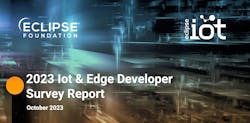The State of IoT and Edge Technology Development
As much of the core building blocks of industrial automation remain in place, the world of automation technology hardware and software continues to evolve rapidly. As an OEM or end user of industrial automation, the trends around automation technology development may not be very important to your day-to-day job, but keeping up with what’s happening in this area is key to understanding how the technologies you’re using or assessing today are likely to change in the near term.
Good insights into the trends around industrial technology development can be seen in the results of The Eclipse Foundation’s 2023 IoT & Edge Developer Survey. The Eclipse Foundation is an open-source software foundation. The survey, administered by the Eclipse IoT Working Group, the Eclipse Edge Native Working Group and the Eclipse Sparkplug Working Group, provides key insights into IoT and edge computing industry landscapes, the challenges developers are facing and the opportunities for enterprise stakeholders in the IoT and edge open-source ecosystem. More than 1,000 global developers, committers, architects and decision-makers from a broad set of industries and organizations participated in the study.
“What’s clear [from the survey results] is that developers are actively building production solutions leveraging open-source technologies to tackle today’s IoT challenges across industrial, agricultural and municipal settings,” said Mike Milinkovich, executive director of the Eclipse Foundation.
Key findings include:
● Development is increasing across all IoT sectors. Industrial automation is once again the top area of focus (33%, up from 22%), followed by agriculture (29%, up from 23%), building automation, energy management, and smart cities (all at 24%).
● Control logic (40%) surpassed artificial intelligence (37%) as the most common edge computing workload. The Eclipse Foundation notes that this could imply a renewed focus on the practical aspects of delivering real-world solutions, but says, “only time will tell.”
● MQTT expands its IIoT communication protocol leadership. Nearly half of developers (49%) indicate that MQTT is their preferred IIoT communication protocol, with MQTT + Sparkplug checking in at 8%.
● Developers indicate that Java is the preferred language for IoT gateways and edge nodes, while C, C++ and Java are the most widely used programming languages for constrained devices.
● 5G is enabling accelerated IIoT adoption. Cellular adoption has doubled since 2022 (44% vs 22% in 2022) largely due to 5G penetration, while Wi-Fi (38% vs 36% in 2022), Ethernet (38% vs 29% in 2022) and Bluetooth (23% vs 20% in 2022) continue to be viable options.
● The withdrawal of IoT middleware providers has created an opportunity for innovators to enter the market. Google Cloud IoT Platform, Bosch IoT Suite, IBM Watson IoT and SAP Internet of Things all exited the market in 2022 or announced their intent to do so. While nearly half of respondents indicated a relationship with one or more of these providers, only 12% have migrated to a new provider. While the market remains relatively fragmented, there is an opportunity for new and emerging middleware offerings that are purpose-built or aligned to specific applications or vertical markets.
● Software supply chain security has become an essential issue for IoT/edge developers, with 70% saying it is vital to their work.
The full survey report contains further insights on developer choices for edge computing workloads, platform connectivity, developer concerns, and use case breakdowns by market. In addition, the report provides breakdowns of use cases by market and detailed recommendations on the next steps for IoT developers.
In other news from the Eclipse Foundation, the organization, in collaboration with the Eclipse Sparkplug Working Group, has announced that the Sparkplug 3.0 specification has been published as an international standard. This publication is the outcome of a transposition of the specification through the Publicly Available Specification (PAS) process offered by the ISO and IEC Joint Technical Committee (JTC 1) for information technology, a consensus-based, voluntary international standards group.
Sparkplug is an open software specification that enables mission-critical operations technology (OT) clients to use industry standards, including MQTT, to integrate data from their applications, sensors, devices and gateways with most Industrial Internet Of Things (IIoT) infrastructure.

